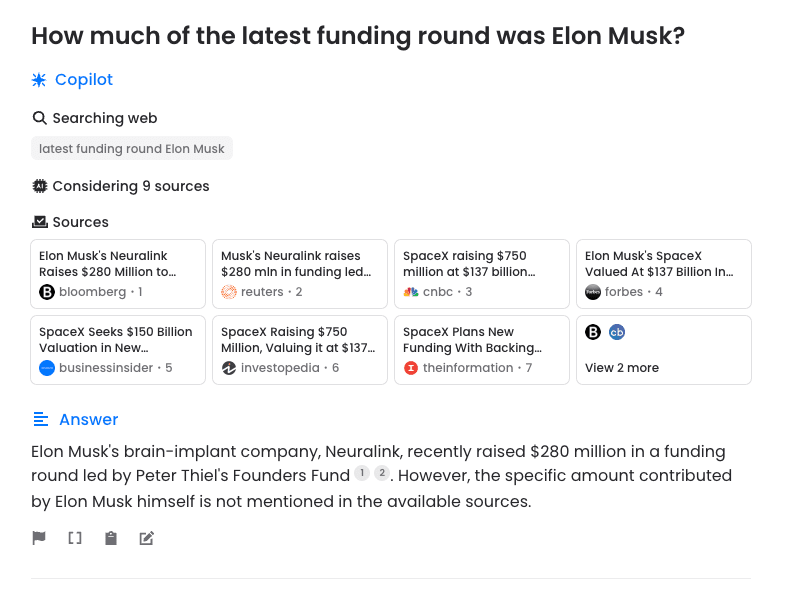A Glimpse into the Perplexity AI Experience
Imagine engaging with a search engine that mimics a knowledgeable friend in a conversation. This unique interaction is made possible by integrating advanced LLMs such as GPT-4 and LLaMa 2.
Perplexity AI is attempting to go beyond the realm of conventional search engines. Their innovations extend to a native iOS app and the incorporation of voice capabilities. It’s open-source and designed to provide more comprehensive and accurate answers than traditional search engines. This forward-thinking approach places them at the vanguard of technological progress.
Sample search

Redefining Search: A Paradigm Shift
Integrating AI-driven platforms like Perplexity AI could potentially mark a significant turning point in the dynamic landscape of search technology. While established giants like Google have long dominated the search realm, the emergence of AI-powered search engines introduces new dimensions.
Google has also begun integrating generative AI suggestions at the forefront of its search results page. This innovation has the potential to reshape how users interact with search results and engage with online content.
The Evolution of Google Search: Generative AI Suggestions Redefining User Experience
Traditionally, search engines like Google have presented users with static links to web pages as search results. However, integrating generative AI suggestions introduces a dynamic layer to this process. As users type their queries, AI algorithms analyze the input and generate real-time suggestions beyond conventional search results. These AI-generated suggestions aim to provide immediate and contextually relevant information, previewing what users can expect from the search results.
This shift has several implications for the search experience:
- Enhanced Relevance: Generative AI suggestions can understand user intent more comprehensively. Users may find immediate value without navigating multiple search results by preemptively offering relevant content and answers.
- Efficiency and Accessibility: The AI-generated suggestions can expedite the search process, particularly for users seeking quick answers or concise information. This is especially beneficial for mobile users and those looking for swift insights.
- Content Engagement: As generative AI suggestions offer concise summaries or snippets of information, there is the potential for increased user engagement with specific content. Users can gauge the relevance and quality of the information before delving deeper.
- Impact on Web Traffic: The introduction of generative AI suggestions could influence the distribution of traffic across web pages. Users might find the information they need directly from the suggestions, reducing the need to click through to individual pages.
- Adaptation and Optimization: Content creators and businesses may need to adapt their strategies to align with this evolving search landscape. Crafting content that stands out in AI-generated suggestions becomes crucial for maintaining visibility and relevance.
The digital content landscape is poised for evolution in this transformative era of search dynamics, the relationship between AI-driven search engines, established players like Google, and newcomers like Perplexity.ai.
Adapting to this evolving landscape will likely require a combination of agility, strategic thinking, and a deep understanding of how AI search impacts user behaviors and expectations. As these changes unfold, the collective journey of AI-powered search and its implications continues to grow before us.
What do you think?
Is it all just a dystopian episode of Black Mirror in the making? Let us know in the comments below!

